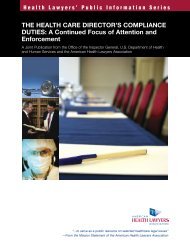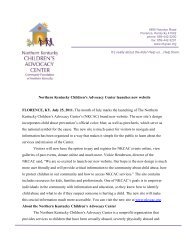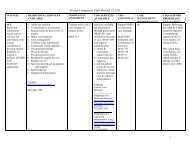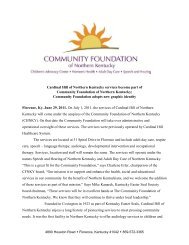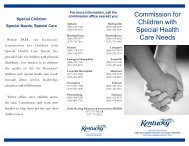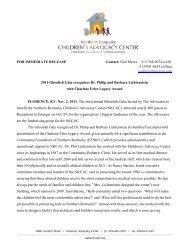Medical Research: A Consumer's Guide for Participation
Medical Research: A Consumer's Guide for Participation
Medical Research: A Consumer's Guide for Participation
You also want an ePaper? Increase the reach of your titles
YUMPU automatically turns print PDFs into web optimized ePapers that Google loves.
therapy to assess safety and effectiveness. Other Phase<br />
III trials look at existing treatments to see if they are<br />
effective <strong>for</strong> a different condition. Phase III trials may<br />
also look at whether changing the dose or the way the<br />
drug is provided changes how well the treatment<br />
works.<br />
In some Phase III trials, all participants receive the<br />
drug being tested. In others, participants are<br />
randomly assigned to different groups, usually by<br />
computer. This protects against bias and helps to<br />
ensure that human choices and outside factors do not<br />
influence the study’s results. One group (Group A)<br />
receives the product being tested, and the other<br />
group (Group B) may receive standard therapy or a<br />
placebo. In a blinded study, neither the participant<br />
nor the research team knows if the participant is<br />
receiving the product being tested. In some trials,<br />
Group A and Group B switch places halfway through<br />
the trials so that each group receives the study<br />
product <strong>for</strong> one-half of the trial. This is called a crossover<br />
design.<br />
Studies generally move into Phase III only after the<br />
product has shown promise in Phases I and II. Phase<br />
III trials often involve large numbers of people (1,000<br />
to 5,000) and are often conducted in several locations.<br />
Some Phase III trials take place in multiple countries.<br />
On average, it takes about seven years to complete<br />
Phases I, II, and III testing of a new treatment.<br />
Phase IV trials evaluate the long term safety and effectiveness<br />
of a drug. Phase IV usually occurs after the<br />
drug has been approved <strong>for</strong> use by the FDA. Several<br />
thousands of individuals may participate in a Phase IV<br />
study. This level of participation is less common in<br />
Phase I, II or III. Phase IV studies are increasingly<br />
being required by regulators to assure long term<br />
safety and effectiveness after initial approval.<br />
<strong>Medical</strong> devices are studied in a similar way. After a<br />
device is developed, an initial study called a feasibility<br />
study is conducted. Feasibility studies focus on evaluating<br />
whether the device is useful. A feasibility study is<br />
also called a pilot study. Wider testing of the device<br />
occurs in a pivotal study. Pivotal studies are similar to<br />
Phase II and Phase III studies in drugs. Even after a<br />
device is approved <strong>for</strong> use by the FDA, long term<br />
studies may be conducted.<br />
5. Where Are Clinical Trials Conducted?<br />
Clinical trials may be conducted at hospitals, in clinics,<br />
or through physician offices. <strong>Research</strong> can also be<br />
conducted at nursing homes, community cancer<br />
programs, and special research institutes. The choice<br />
about where to hold a clinical trial is partly based on<br />
the kinds of research activities required. Some procedures,<br />
<strong>for</strong> example, need to be done in a hospital,<br />
while others can be safely done in a clinic or physician’s<br />
office. The location of the trial can also be based<br />
on the risks associated with the trial. In some cases, it is<br />
important to hold the study in a location that can<br />
handle surgical emergencies. Other studies may<br />
require that special medication be available. When<br />
planning a clinical trial, sponsors look <strong>for</strong> physicians<br />
who are experienced principal investigators, who<br />
understand the special requirements of clinical trials,<br />
and who have access to well-trained research support<br />
teams. Many academic medical centers and teaching<br />
hospitals have research as part of their mission, as do<br />
many community hospitals.<br />
6. How Can I Find Out About a Clinical Trial?<br />
Physicians often have in<strong>for</strong>mation about clinical trials.<br />
Hospital websites also list research options. Clinical<br />
trials can be found in newspapers or through radio<br />
and television ads. There are several different<br />
resources on the internet. For example, the federal<br />
website www.clinicaltrials.gov lists many different kinds<br />
of clinical trials. Individuals can search <strong>for</strong> trials based<br />
on a certain disease or where the research is being<br />
conducted. In addition, patient support groups often<br />
have in<strong>for</strong>mation on where clinical trials are being<br />
conducted <strong>for</strong> specific diseases.<br />
8




